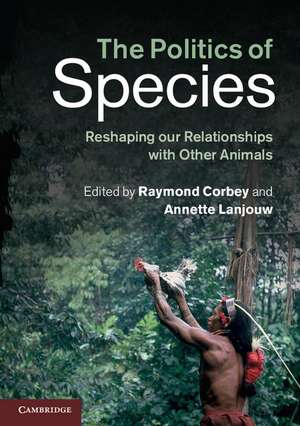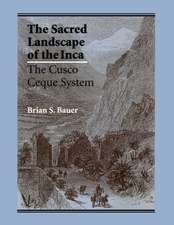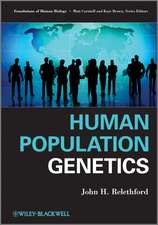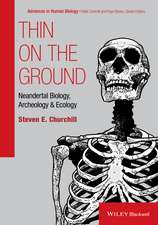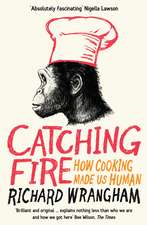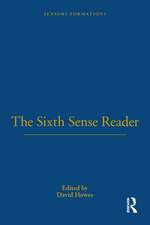The Politics of Species: Reshaping our Relationships with Other Animals
Editat de Raymond Corbey, Annette Lanjouwen Limba Engleză Paperback – 10 sep 2014
| Toate formatele și edițiile | Preț | Express |
|---|---|---|
| Paperback (1) | 349.53 lei 6-8 săpt. | |
| Cambridge University Press – 10 sep 2014 | 349.53 lei 6-8 săpt. | |
| Hardback (1) | 819.32 lei 6-8 săpt. | |
| Cambridge University Press – 4 sep 2013 | 819.32 lei 6-8 săpt. |
Preț: 349.53 lei
Nou
Puncte Express: 524
Preț estimativ în valută:
66.88€ • 69.97$ • 55.56£
66.88€ • 69.97$ • 55.56£
Carte tipărită la comandă
Livrare economică 02-16 aprilie
Preluare comenzi: 021 569.72.76
Specificații
ISBN-13: 9781107434875
ISBN-10: 1107434874
Pagini: 310
Ilustrații: 34 b/w illus. 1 table
Dimensiuni: 170 x 245 x 17 mm
Greutate: 0.49 kg
Editura: Cambridge University Press
Colecția Cambridge University Press
Locul publicării:New York, United States
ISBN-10: 1107434874
Pagini: 310
Ilustrații: 34 b/w illus. 1 table
Dimensiuni: 170 x 245 x 17 mm
Greutate: 0.49 kg
Editura: Cambridge University Press
Colecția Cambridge University Press
Locul publicării:New York, United States
Cuprins
List of contributors; Preface; Introduction: between exploitation and respectful coexistence Raymond Corbey and Annette Lanjouw; Part I. Moving Beyond Speciesism: 1. How speciesism undermines compassionate conservation and social justice Marc Bekoff; 2. The rights of sentient beings: moving beyond old and new speciesism Joan Dunayer; 3. Indexically yours: why being human is more like being here than like being water David Livingstone Smith; 4. Apeism and racism: reasons and remedies Edouard Machery; 5. 'Race' and species in the post-WW2 United Nations discourse on human rights Raymond Corbey; 6. Addressing the animal-industrial complex Richard Twine; Part II. Sentience and Agency: 7. Humans, dolphins and moral inclusivity Lori Marino; 8. The expression of grief in monkeys, apes and other animals Barbara J. King; 9. Great ape mindreading: what's at stake? Kristin Andrews; 10. Intersubjective engagements without theory of mind: a cross-species comparison Daniel Hutto; 11. 'Unnatural behaviour': obstacle or insight at the species interface? Lucy Birkett and William McGrew; 12. Animals as persons in Sumatra Jet Bakels; 13. Interspecies love: being and becoming with a common ant, Ectatomma ruidum (Roger) Eben Kirksey; Part III. Towards Respectful Coexistence: 14. Social minds and social selves: redefining the human-alloprimate interface Agustin Fuentes; 15. The human-macaque interface in the Sulawesi Highlands Erin Riley; 16. The fabric of life: linking conservation and welfare Annette Lanjouw; 17. Home flocks: deindustrial domestications on the coop tour Molly Mullin; 18. Entangled empathy: an alternative approach to animal ethics Lori Gruen; 19. Extending human research protections to nonhuman animals Hope Ferdowsian and Chong Choe; 20. The capacity of nonhuman animals for legal personhood and legal rights Steven Wise; Afterword Jon Stryker; References; Index.
Recenzii
'Whereas everybody agrees that making the world a better place is a worthwhile endeavour, an open question remains: better for whom? The Politics of Species brilliantly highlights the scientific, moral and political importance of this topical question. Having done penance for their wrongs of racism, xenophobia, class hatred and sexism, Western societies need to engage in ethical reflexion about the merciless domination and exploitation they inflict on animals. In a series of fascinating case studies, leading experts from a broad range of disciplines supply such a reflexion with a rich factual and conceptual basis, linking scientific data with normative and philosophical ideas in a plea for a renewed moral vision of relationships between humans and nonhuman beings.' Wiktor Stoczkowski, L'École des Hautes Études en Sciences Sociales
'The editors of this book have to be complimented for bringing together a great collection of chapters by experts from a diversity of disciplines, dealing in depth with the various issues involved. There are more idealistic and more pragmatic stances in the book, but these all converge on the conclusion that our recent insights in animal behaviour and cognition force us to rethink and reshape our relations with animals to guarantee a sustainable and acceptable community of life forms on this planet in respectful co-existence.' J. A. R. A. M. van Hooff, Utrecht University
'… offer[s] up a thought-provoking range of ideas and approaches for considering the status of non-humans in contemporary societies.' S. C. Baker, Choice
'The Politics of Species takes a hard look at our cultural assumptions of humanity's profound separation from and superiority to other animal species, and the many abuses of non-humans that follow from those assumptions … overall, the book provides an excellent introduction to the focused issue of human domination of non-human animals, and contains new arguments which will engage people already familiar with the discourse.' Ian Werkheiser, Biological Conservation
'The editors of this book have to be complimented for bringing together a great collection of chapters by experts from a diversity of disciplines, dealing in depth with the various issues involved. There are more idealistic and more pragmatic stances in the book, but these all converge on the conclusion that our recent insights in animal behaviour and cognition force us to rethink and reshape our relations with animals to guarantee a sustainable and acceptable community of life forms on this planet in respectful co-existence.' J. A. R. A. M. van Hooff, Utrecht University
'… offer[s] up a thought-provoking range of ideas and approaches for considering the status of non-humans in contemporary societies.' S. C. Baker, Choice
'The Politics of Species takes a hard look at our cultural assumptions of humanity's profound separation from and superiority to other animal species, and the many abuses of non-humans that follow from those assumptions … overall, the book provides an excellent introduction to the focused issue of human domination of non-human animals, and contains new arguments which will engage people already familiar with the discourse.' Ian Werkheiser, Biological Conservation
Descriere
Experts from a range of disciplines identify the key barriers to a definition of moral respect that includes nonhuman animals.
